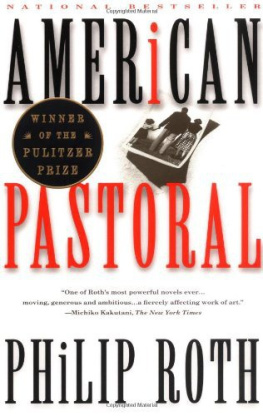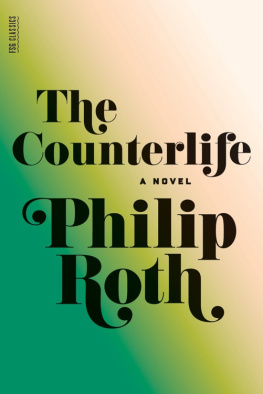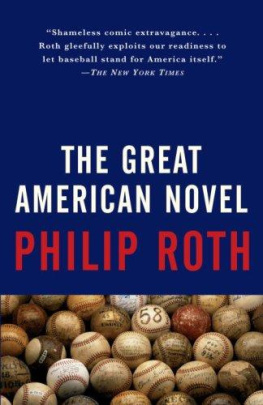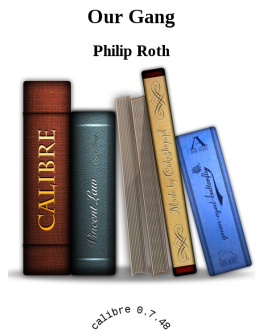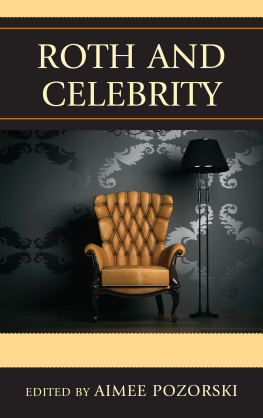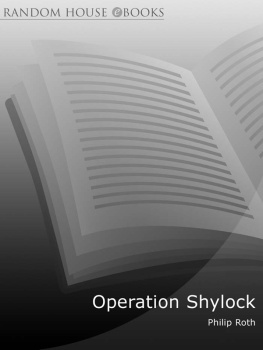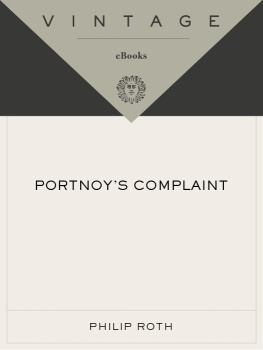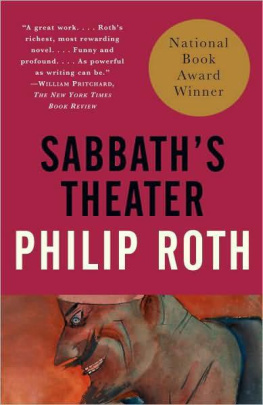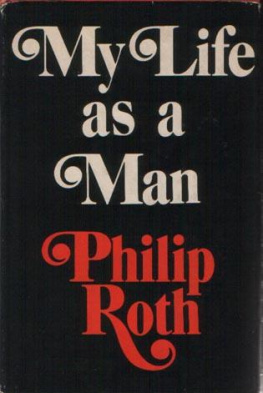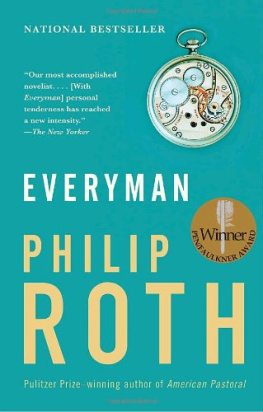Houghton Mifflin Harcourt
BOSTON NEW YORK
2009
BOOKS BY PHILIP ROTH
ZUCKERMAN BOOKS
The Ghost Writer
Zuckerman Unbound
The Anatomy Lesson
The Prague Orgy
The Counterlife
American Pastoral
I Married a Communist
The Human Stain
Exit Ghost
ROTH BOOKS
The Facts Deception
Patrimony Operation Shylock
The Plot Against America
KEPESH BOOKS
The Breast
The Professor of Desire
The Dying Animal
MISCELLANY
Reading Myself and Others
Shop Talk
OTHER BOOKS
Goodbye, Columbus Letting Go
When She Was Good Portnoy's Complaint Our Gang
The Great American Novel My Life as a Man
Sabbath's Theater Everyman Indignation
The Humbling
This is a work of fiction. Names, characters, and
incidents are the product of the author's imagination.
Copyright 2009 by Philip Roth
All rights reserved
For information about permission to reproduce selections
from this book, write to Permissions, Houghton Mifflin
Harcourt Publishing Company, 215 Park Avenue South,
New York, New York 10003.
www.hmhbooks.com
Library of Congress Cataloging-in-Publication Data
Roth, Philip.
The humbling / Philip Roth.
p. cm.
ISBN 978-0-547-23969-9
I. Title.
PS 3568.0855 H 85 2009
813.54-dc22 2009013742
Printed in the United States of America
Book design by Robert Overholtzer
DOC 10 9 8 7 6 5 4 3 2 1
The teaching technique credited to Vincent Daniels
on page 34 is borrowed from How to Stop Acting
by Harold Guskin (Faber and Faber, 2003).
For J. T.
1. Into Thin Air
H E'D LOST HIS MAGIC . The impulse was spent. He'd never failed in the theater, everything he had done had been strong and successful, and then the terrible thing happened: he couldn't act. Going onstage became agony. Instead of the certainty that he was going to be wonderful, he knew he was going to fail. It happened three times in a row, and by the last time nobody was interested, nobody came. He couldn't get over to the audience. His talent was dead.
Of course, if you've had it, you always have something unlike anyone else's. I'll always be unlike anyone else, Axler told himself, because I am who I am. I carry that with methat people will always remember. But the aura he'd had, all his mannerisms and eccentricities and personal peculiarities, what had worked for Falstaff and Peer Gynt and Vanyawhat had gained Simon Axler his reputation as the last of the best of the classical American stage actorsnone of it worked for any role now. All that had worked to make him himself now worked to make him look like a lunatic. He was conscious of every moment he was on the stage in the worst possible way. In the past when he was acting he wasn't thinking about anything. What he did well he did out of instinct. Now he was thinking about everything, and everything spontaneous and vital was killedhe tried to control it with thinking and instead he destroyed it. All right, Axler told himself, he had hit a bad period. Though he was already in his sixties, maybe it would pass while he was still recognizably himself. He wouldn't be the first experienced actor to go through it. A lot of people did. I've done this before, he thought, so I'll find some way. I don't know how I'm going to get it this time, but I'll find itthis will pass.
It didn't pass. He couldn't act. The ways he could once rivet attention on the stage! And now he dreaded every performance, and dreaded it all day long. He spent the entire day thinking thoughts he'd never thought before a performance in his life: I won't make it, I won't be able to do it, I'm playing the wrong roles, I'm overreaching, I'm faking, I have no idea even of how to do the first line. And meanwhile he tried to occupy the hours doing a hundred seemingly necessary things to prepare: I have to look at this speech again, I have to rest, I have to exercise, I have to look at that speech again, and by the time he got to the theater he was exhausted. And dreading going out there. He would hear the cue coming closer and closer and know that he couldn't do it. He waited for the freedom to begin and the moment to become real, he waited to forget who he was and to become the person doing it, but instead he was standing there, completely empty, doing the kind of acting you do when you don't know what you are doing. He could not give and he could not withhold; he had no fluidity and he had no reserve. Acting became a night-after-night exercise in trying to get away with something.
It had started with people speaking to him. He couldn't have been more than three or four when he was already mesmerized by speaking and being spoken to. He had felt he was in a play from the outset. He could use intensity of listening, concentration, as lesser actors used fireworks. He had that power offstage, too, particularly, when younger, with women who did not realize that they had a story until he revealed to them that they had a story, a voice, and a style belonging to no other. They became actresses with Axler, they became the heroines of their own lives. Few stage actors could speak and be spoken to the way he could, yet he could do neither anymore. The sound that used to go into his ear felt as though it were going out, and every word he uttered seemed acted instead of spoken. The initial source in his acting was in what he heard, his response to what he heard was at the core of it, and if he couldn't listen, couldn't hear, he had nothing to go on.
He was asked to play Prospero and Macbeth at the Kennedy Centerit was hard to think of a more ambitious double billand he failed appallingly in both, but especially as Macbeth. He couldn't do low-intensity Shakespeare and he couldn't do high-intensity Shakespeareand he'd been doing Shakespeare all his life. His Macbeth was ludicrous and everyone who saw it said as much, and so did many who hadn't seen it. "No, they don't even have to have been there," he said, "to insult you." A lot of actors would have turned to drink to help themselves out; an old joke had it that there was an actor who would always drink before he went onstage, and when he was warned "You mustn't drink," he replied, "What, and go out there alone?" But Axler didn't drink, and so he collapsed instead. His breakdown was colossal.
The worst of it was that he saw through his breakdown the same way he could see through his acting. The suffering was excruciating and yet he doubted that it was genuine, which made it even worse. He did not know how he was going to get from one minute to the next, his mind felt as though it were melting, he was terrified to be alone, he could not sleep more than two or three hours a night, he scarcely ate, he thought every day of killing himself with the gun in the attica Remington 870 pump-action shotgun that he kept in the isolated farmhouse for self-defenseand still the whole thing seemed to be an act, a bad act. When you're playing the role of somebody coming apart, it has organization and order; when you're observing yourself coming apart, playing the role of your own demise, that's something else, something awash with terror and fear.
He could not convince himself he was mad any more than he'd been able to convince himself or anyone else he was Prospero or Macbeth. He was an artificial madman too. The only role available to him was the role of someone playing a role. A sane man playing an insane man. A stable man playing a broken man. A self-controlled man playing a man out of control. A man of solid achievement, of theatrical renowna large, burly actor standing six feet four inches tall, with a big bald head and the strong, hairy body of a brawler, with a face that could convey so much, a decisive jaw and stern dark eyes and a sizable mouth he could twist every which way, and a low commanding voice emanating from deep down that always had a little growl in it, a man conscientiously on the grand scale who looked as if he could stand up to anything and easily fulfill all of a man's roles, the embodiment of invulnerable resistance who looked to have absorbed into his being the egoism of a dependable giantplaying an insignificant mite. He screamed aloud when he awakened in the night and found himself still locked inside the role of the man deprived of himself, his talent, and his place in the world, a loathsome man who was nothing more than the inventory of his defects. In the mornings he hid in bed for hours, but instead of hiding from the role he was merely playing the role. And when finally he got up, all he could think about was suicide, and not its simulation either. A man who wanted to live playing a man who wanted to die.
Next page

